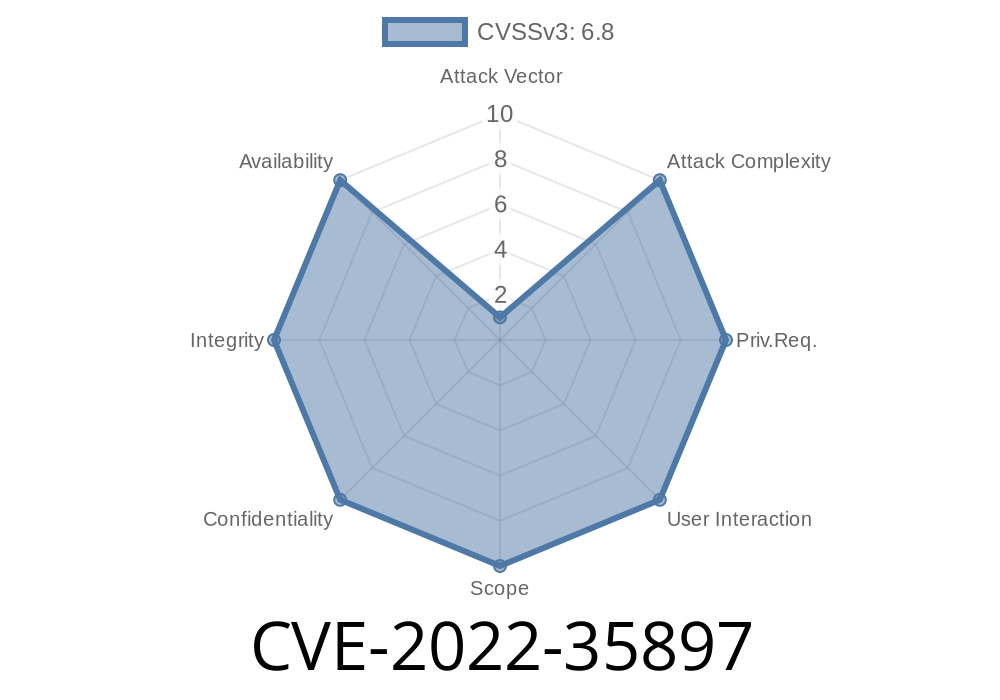CVE-2022-35897 is a security vulnerability affecting Insyde InsydeH2O firmware (kernel versions 5. up to 5.5) used by numerous PCs and laptops. Discovered in 2022, this flaw opens the door to arbitrary code execution by exploiting a stack buffer overflow, if an attacker can modify certain UEFI variables directly in firmware storage.
Unlike many operating system exploits, this vulnerability relies on access at the firmware (SPI flash) level, giving it particularly serious implications for computer security, persistence, and rootkit risk. Let’s break down how the bug works, who might target it, and walk through a code snippet and simple proof-of-concept details.
A stack buffer overflow exists in InsydeH2O UEFI kernels 5.–5.5.
- Exploit trick: If an attacker can directly modify at least two of the following UEFI variables—SecureBootEnforce, SecureBoot, and RestoreBootSettings—they can deliberately trigger a stack overflow in firmware code during boot.
- The variables are normally locked down after boot. Attacks require the attacker to rewrite SPI flash memory (physical or privileged remote access).
- A successful exploit means attacker-supplied code may run before any operating system loads—the ultimate persistence attack.
RestoreBootSettings
The code expects these to be in a particular format and length. Under normal use, these are only written by the firmware itself—never by the OS or a user program.
Step 2: Insufficient Input Validation
The UEFI code does not properly check the length/value of these variables before copying their contents to a fixed-size stack buffer.
Step 3: Stack Overflow and Code Execution
If an attacker directly modifies the values in SPI storage so that at least two of these variables are long or malformed, when the firmware code runs, it copies too much data into the buffer, overflowing into adjacent memory. This classic bug allows overwriting return addresses or function pointers on the stack.
If the data is specially crafted, the overflow can divert execution to attacker-controlled code—so-called *arbitrary code execution* at the firmware level.
Visualizing the Vulnerable Code
While Insyde does not provide public source, the vulnerable function is conceptually like this (in C-like pseudocode):
#define BUF_SIZE 32
void RestoreSecureBootSettings() {
char buf[BUF_SIZE];
UINTN size = GetVariableSize("SecureBootEnforce");
// No length check; attacker can set very large size value
// BAD: May copy much more than BUF_SIZE bytes!
GetUEFIVariable("SecureBootEnforce", buf, size);
// … Some code using buf, which can now contain malicious data
// If attacker controls "RestoreBootSettings" too,
// similar overflow can be triggered again in sequence.
}
*What’s the Problem?*
- No check if incoming variable size is bigger than 32 bytes, so long attacker payload overflows stack buffer.
- Simple SPI programmers, jailbroken firmware, or privileged malware could change these variables "offline."
Exploitation: Attack Steps
While the attacker cannot exploit this via common malware or user-level access (OS blocks editing of these variables), attacks may be possible in these scenarios:
- Evil Maid Attack: Someone with physical access boots from an external device and rewrites the SPI flash chip.
- Supply Chain Attack: Hardware compromised before sale; attacker programs SPI image containing malicious variables.
- Privileged Malware: If an attacker gains SYSTEM-level access or exploits another firmware writing bug, they could edit the flash.
Exploit Steps (PoC Outline):
1. Use SPI programmer (e.g., CH341A) to dump/modify system’s flash memory, or use a privileged tool in the OS if available.
Locate the storage for SecureBootEnforce and SecureBoot (format varies by vendor).
3. Overwrite at least _two_ of the three critical variables with data longer than 32 bytes, containing attacker code and a pointer/return address overwrite.
4. Reinstall the SPI image, reboot, and observe if the payload executes during UEFI post-boot routines—this could, for example, patch the OS loader, implant a persistent backdoor, or brick the platform.
Warning: _Doing this on a real system could brick your motherboard!_
Although no full public exploit exists, here’s pseudo-PoC for a modified SPI dump (conceptual)
# WARNING: For educational illustration only
# Read SPI flash
with open("spi_dump.bin", "rb") as f:
spi = bytearray(f.read())
# Offset and length would be chip/model specific!
offset = find_variable_offset(spi, b"SecureBootEnforce")
malicious_payload = b"A" * 40 + b"\xDE\xAD\xBE\xEF" # Overwrite return addr
# Overwrite variable in SPI dump
spi[offset:offset+len(malicious_payload)] = malicious_payload
# Same for SecureBoot or RestoreBootSettings
offset2 = find_variable_offset(spi, b"SecureBoot")
spi[offset2:offset2+len(malicious_payload)] = malicious_payload
# Save back
with open("spi_patch.bin", "wb") as f:
f.write(spi)
Reflashing the patched spi_patch.bin will repair or break the system, depending on payload.
Defense and Mitigation
- Update firmware: Insyde and OEMs released updates to validate these variable sizes before copying—_always upgrade to patched UEFI!_
- Lock your SPI: BIOS/UEFI write-protection and password protection help. Many new systems include hardware protections.
Physical security: Mark your device cases, use tamper-evident stickers for high-value targets.
- Monitor for abnormal SPI/UEFI writes: Use endpoint security solutions able to spot such events.
More Information and References
- National Vulnerability Database: CVE-2022-35897
- Insyde Security Updates (search for CVE-2022-35897)
- Eclypsium UEFI Attack Research
- UEFI Stack Buffer Overflows: The Next Generation (related, general background)
Closing Thoughts
CVE-2022-35897 is a textbook example of why firmware code must be as robust and well-tested as any user program. Even "hidden" variables, presumed safe because only firmware accesses them, can become a massive security exposure if physical or privileged attackers can rewrite SPI storage. Upgrading firmware and establishing a secure boot chain is vital, especially for high-risk users, enterprises, and anyone concerned with rootkits or government-level threats.
Stay updated and keep your firmware secure!
*This post is written exclusively for educational purposes. Never attempt these steps and always follow the law and responsible disclosure practices.*
Timeline
Published on: 11/21/2022 17:15:00 UTC
Last modified on: 11/30/2022 18:49:00 UTC
